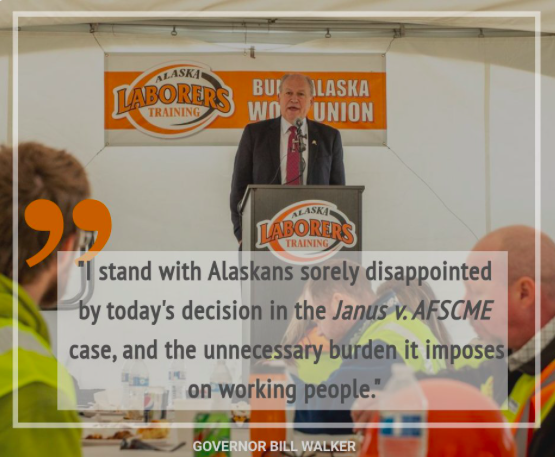STANDS AGAINST WORKERS’ FIRST AMENDMENT RIGHTS
The U.S. Supreme Court said its decision on Janus vs. AFSCME was about workers being entitled to their free speech rights and public employees not being forced to pay dues to unions that advocate for candidates and policies the workers may oppose.
But Gov. Bill Walker today opposed the court’s decision, coming squarely down on the side of forced union dues.
On Twitter, Walker wrote, “News out of #SCOTUS today is a disappointment: making life more difficult for working people is not the way we grow our economy, stand up for our neighbors, or support our communities.”

“I stand with the many Alaskans who are disappointed by today’s Supreme Court decision in the Janus v. AFSCME case. This creates an unnecessary obstacle for working people to join behind a unified voice. Still, I am confident that public employee unions will remain the backbone of our state for the foreseeable future,” Walker said in a separate statement.
“Nothing in this decision changes the respect we as the State of Alaska have for the role labor unions play in the operation of state government,” Walker said.
His statement was almost identical to that issued by New Jersey Democrat Gov. Phil Murphy: “This disappointing decision does not in any way diminish our administration’s commitment to protecting the right of public sector employees to organize,” Murphy wrote.

Jeremy Price, Alaskan director for Americans for Prosperity, called the decision a “game changer.”
“The court said that collective bargaining in the public sector is inherently political speech because it influences policy. It is unconstitutional to restrict the First Amendment rights of those employees who don’t want to engage in that political activity.
“The common refrain is government workers who don’t pay dues are ‘free riding.’ But the public unions have been free riding on the backs of workers who wanted nothing to do with the unions for decades,” Price said.
Before the ruling, public employees could opt out of a portion of their dues that were used for political work. But the effort it took to opt out was onerous, far more than most workers would be able to do. Now, with the Janus decision on the books, it’s clear that public employees will be in a position of “opting in” to unions, rather than opting out.
“The onus is on the unions to show that the employee has given express permission for their money to be taken,” Price said.
Wasilla teacher Kathy McCollum wrote an opinion piece that was published on Fox News today about the thousands of dollars she has been forced to pay to the National Education Association against her will. She wrote, in part:
“In my home state of Alaska, teachers and other public employees are forced to pay fees to unions they didn’t choose to represent them, in order to hold the jobs they love.
“Before moving to Alaska, I was a teacher in Idaho, a right-to-work state, where membership in a union is a choice. I chose not to belong.
“When I arrived in Alaska in 1989, I was shocked to be told that in order to work as a teacher, union membership was mandatory. In addition, the monthly dues would be taken directly from my paycheck and deposited into the union coffers.
“I have now been a public school teacher in Alaska for 29 years and am thankful to have such a rewarding profession. I work hard and want to do this important job, and now I finally won’t have to pay an organization just for the privilege of teaching.
“In addition to the unfairness of having to pay a union just to keep one’s job, my union often used my dues to promote policies I don’t support. The concepts of seniority, tenure and ‘last in, first out’ don’t allow for the possibility that some first-year teachers may get better results than ones who have been working longer,” she wrote.
Candidate Mark Begich agreed with Gov. Walker, however, by saying, “Today’s Supreme Court decision undermines working families in Alaska and across the country. Unions make the entire workforce stronger, safer, and drive the economy.”
Some 23 percent of Alaska’s workforce are members of a union, the third highest percentage in the nation, after New York and Hawaii. In 1964, nearly 40 percent of the Alaska workforce belonged to a union. Most union workers in Alaska are public sector employees, whose dues fill up the bulk of union coffers, which in turn almost always go to support Alaska Democratic Party candidates.